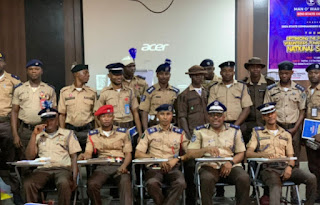WSSCC, UN Women hold regional conference on reducing gender inequalities in WASH
UN Women and the Water Supply and Sanitation Collaborative Council (WSSCC) hold a regional conference on the reduction of gender inequalities in the water, sanitation and hygiene (WASH) sector
On 18 and 19 June, Dakar hosted the regional conference on the reduction of gender inequalities in the WASH sector. Over two days and coming from twenty countries of West and Central Africa, representatives of sectoral ministries and United Nations agencies, elected officials, academics, researchers and representatives of civil society organizations and technical and financial partners conducted a review of progress on the extent to which the specific needs of women and girls are addressed in the water, sanitation and hygiene sector, with a particular focus on menstrual hygiene management (MHM).
Organized as part of the joint WSSCC and UN Women Gender, Hygiene and Sanitation programme, the regional conference provided an opportunity to share the findings of the final evaluation of the programme, innovations made in recent years and, lastly, the results of research on the issue of menstrual hygiene, a topic which has long remained a taboo, unmentioned in public policies.
The regional conference allowed experts and actors in the water, sanitation and hygiene sector to discuss priority issues, such as the level of public knowledge of menstrual hygiene management (MHM), its integration into educational curriculums, community approaches to promote women’s and girls’ access to WASH services, MHM in humanitarian situations, state accountability and the monitoring of WASH indicators, innovative local initiatives and the programme’s impact on its beneficiaries.
It is important to note that the Gender, Hygiene and Sanitation programme was run in the three pilot countries of Cameroon, Niger and Senegal, at a cost of USD 2,650,850. Thus, after four years of implementation, 620 professionals (including officers of government departments) have been trained in menstrual hygiene management and have, in turn, educated and raised the awareness of at least26,000 women and girlsabout menstruation; 25 national policies have been revised to include MHM in the intervention countries and 13 research studies on this issue have been conducted.
Speaking at the opening ceremony of the regional conference, Executive Director of WSSCC Mr Rolf Luyendijk said that it was possible to change women’s and girls’ lives, especially at the time of their first periods, so that they did not miss school when they are younger or take time off work when they are older, and so that society recognized their needs for privacy and appropriate, safe spaces for changing their sanitary protection. UN Women Deputy Regional Director Ms Oulimata Sarrmade the point that the Sustainable Development Goals (SDGs), especially SDG 5, were an opportunity to be seized in order to reduce gender inequalities in the water, sanitation and hygiene sector, to make real progress in women’s empowerment and gender equality and to ensure that the strong commitments made by Member States were honoured.
At the close of the meeting, participants made a public announcement of the outcomes of the regional conference through the Regional Conference on the Reduction of Gender Inequalities in the WASH sector. They also made recommendations for strengthening the upscaling of the pilot programme, whose achievement merit consolidation and extension to other countries.
Photo Gallery













Comments